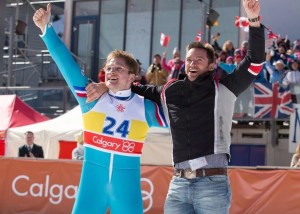Eddie Edwards made a name for himself in the 1988 Calgary Olympics. That is a pretty amazing feat, given the fact that the British ski jumper finished last in every competition he tackled.
Why Edwards charmed Olympic fans around the globe was due to his tenacity and refusing-to-give-up attitude that not only got him to the games and making it to the iconic every-four-year sports event as Britain’s first ski jumper in decades — but he set records along the way.
His tale comes to joyous life in Eddie the Eagle.
Many sports movies have the natural winning moment that the entire plot line is racings towards as the film progresses. With Miracle, it was the U.S. Hockey team winning gold and upsetting the Russians along the way. But, like Moneyball before it, Eddie the Eagle has to focus on something else in the triumphant department because of Edwards’ last place finish at the Calgary games. It is the double barreled power of his journey to the games themselves, and the fact that he would break British Olympic marks for ski jumping that would make him a national treasure. Hey, it’s not like the Brits had a storied ski jumping history before Edwards!
In Eddie the Eagle, we meet the inspirational soul as a young lad. He has but one dream, to be an Olympian. Problem is, he is no athlete. He tries everything along the way and nothing suits him.
Then, in his twenties, he discovers ski jumping and embarks on an arduous process to tackle the sport and catch the eye of Great Britain’s Olympic committee. This is a sport that world-class athletes arrive at during their younger, single digit, ages. Seeing as his country is sending no one to the games as a ski jumper, he feels he has a shot to finally be an Olympian. He only has to complete a successful jump at a committee-approved facility.
So, off he goes to Germany to one of the premiere ski jumping establishments in the world. Edwards promptly falls on his face quite a few times and busts quite a few pairs of his trademark thick glasses. It is also at this time that he encounters Hugh Jackman’s Bronson Peary. He is a former U.S. ski jump Olympian who now finds himself working the snow plows at the ski facility and he might just be drunk all the time.
The two form an unlikely bond that the Sean Macaulay and Simon Kelton’s screenplay effectively and efficiently fill with stew of bromance-type, father-son/big brother-little brother emotion.
There are a quartet of elements that make this film gel and have it rise above the mundane sports true tales out there.
First, the star power of Egerton. After his killer work on Kingsman: The Secret Service, the Brit proves himself to be a true talent. He is so convincing as Edwards, it even goes beyond his performance in terms of delivering dialogue. He contorts his body in such a way that for those of us who were inspired by the real life Eddie the Eagle, it becomes hard to separate actor from subject.
Jackman excels and like he did in Real Steel, he captures the spirit of an emotional stunted coach. Yet, this mentor is much different than that robot boxing aficionado. The Australian actor is brilliant at capturing his character’s own professional father-son type of issues that hinder his growth — and perhaps have something to do with how he ended up cleaning ski slopes instead of flying above them.
The score by Matthew Margeson rings so true it only enhances the heart-pulling power of the entire picture. It is pure 80s, from the songs chosen (such as tracks from Hall and Oates) to the Korg fused score that features nothing but electronic instruments made during that era. It’s funny. Watch a movie from the Decade of Decadence and if it has a synth soundtrack, it feels dated. Yet, Eddie the Eagle uses it and it feels authentic the time. It’s the wildest thing.
Lastly, the direction of Fletcher makes this a feel good story that has you firmly leaping with its cheer-exulting payoff. The helmer delivers and what else is fascinating is that the Eddie the Eagle story will actually do what the real life journey of Edwards did — inspire.
Grade: B+



